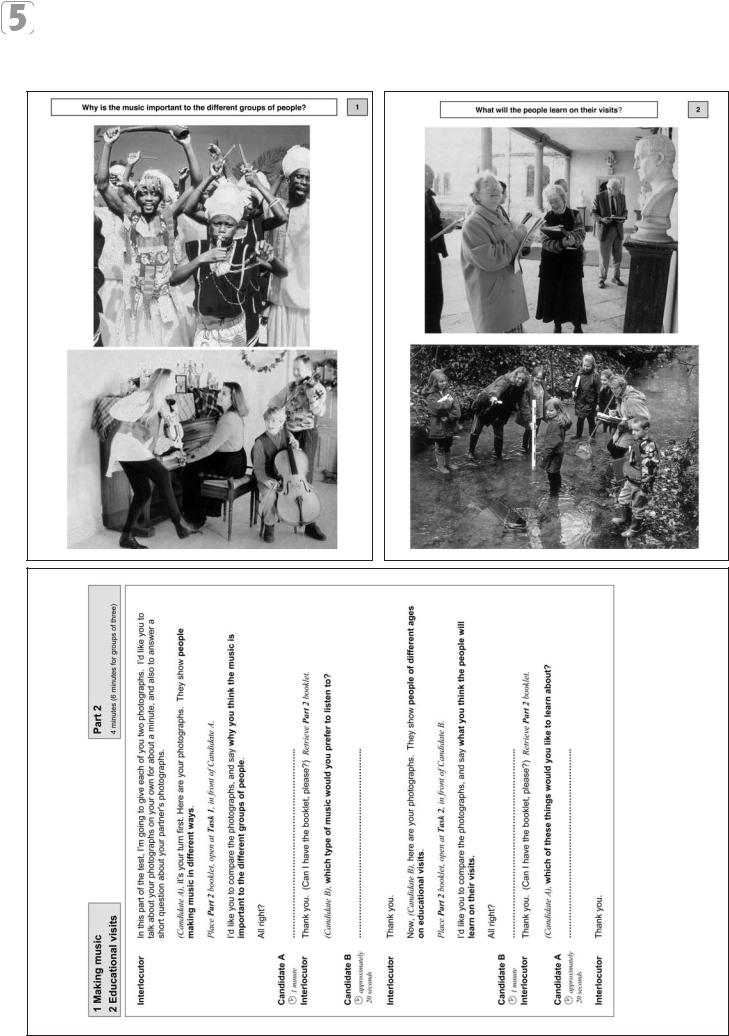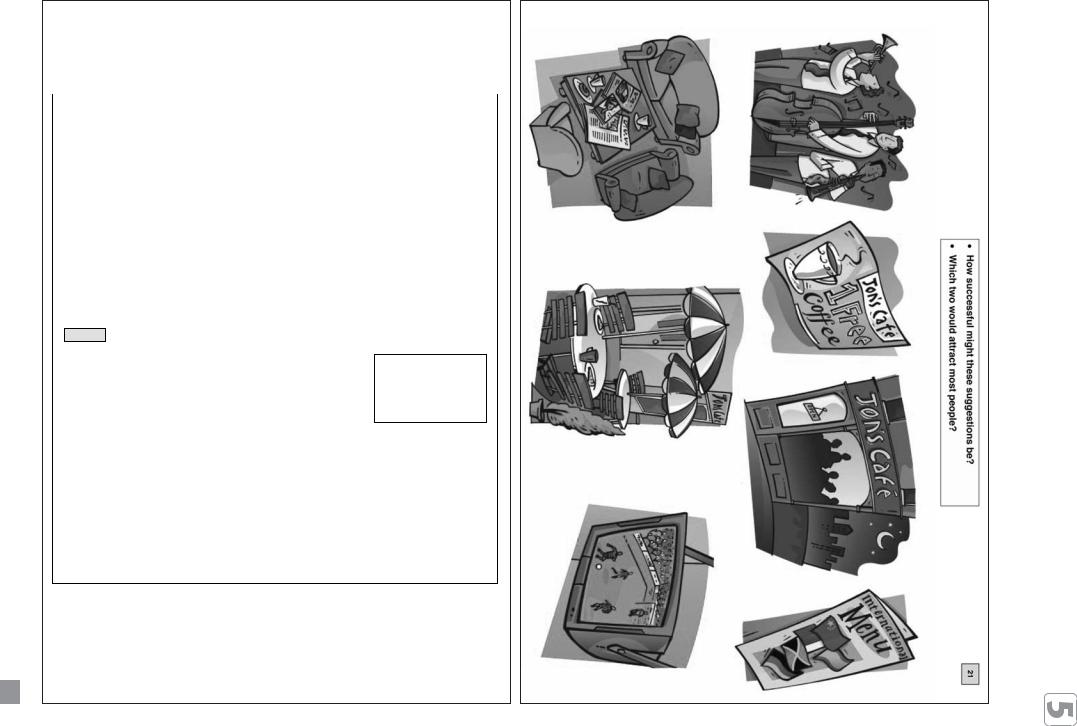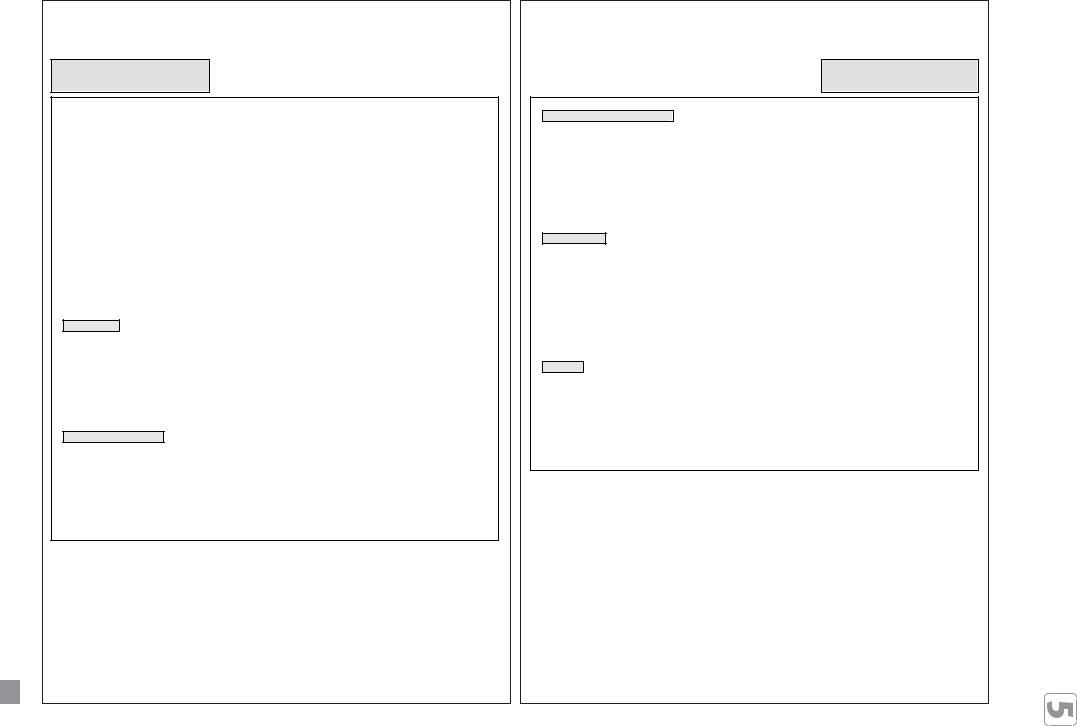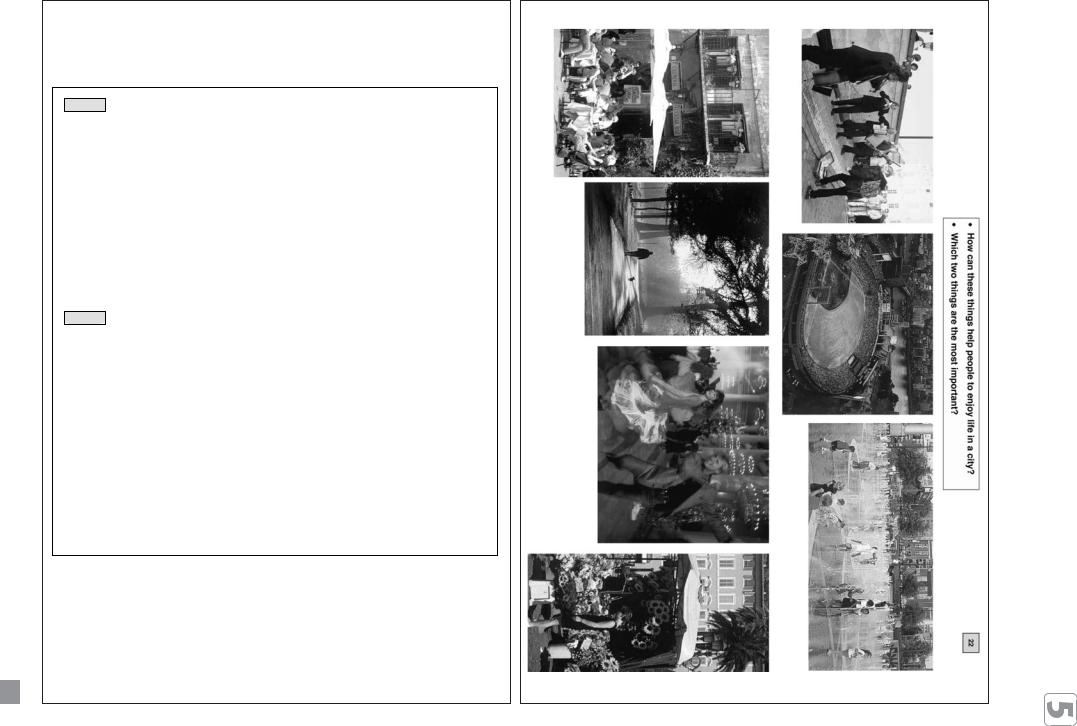
fce_handbook
.pdf
79 1 st te – r pe pa e l p m sa | g n i k a pe s : 5 r pe pa | s r e h c a e t r o f k o o b d n a h e c f
Part 1
3 minutes (5 minutes for groups of three)
Good morning/afternoon/evening. My name is ………… and this is my colleague ………… .
And your names are?
Can I have your mark sheets, please?
Thank you.
First of all we’d like to know something about you.
Where are you from (Candidate A)?
And you (Candidate B)?
What do you like about living (here / name of candidate’s home town)?
And what about you (Candidate A/B)?
Select one or more questions from any of the following categories, as appropriate.
Likes and dislikes
Do you prefer to spend time on your own or with other people? …… (Why?)
Do you like cooking? …… (What sort of things do you cook?)
What’s your favourite food? …… (Why do you like it?)
Do you like going to parties? …… (Tell us about a good party you’ve been to.)
Tell us about a day you’ve really enjoyed recently.
Education and Work
Do you find it easy to study where you live? …… (Why? / Why not?)
Is there something new you’d really like to learn about? …… (Why?)
Are you happier doing mental or physical work? …… (Why?)
Do you prefer working on your own or with other people? …… (Why?)
What kind of work would you really like to do in the future? …… (Why?)
Part 1
3 minutes (5 minutes for groups of three)
Free Time
Who do you spend your free time with? …… (What sort of things do you do together?)
How much time do you spend at home? …… (What do you enjoy doing?)
What sort of music do you listen to? …… (Why do you enjoy it?)
Do you ever go to concerts? …… (What kind of concerts do you enjoy?)
..... (What do you like about them?)
Where do you like listening to music? …… (Why?)
Does anyone you know have an interesting hobby? …… (What does he/she do?)
Have you got any plans for this weekend? …… (What are you going to do?)
Holidays and Travel
Which area of your country would you like to get to know better? …… (Why?) |
What’s the most interesting place you’ve visited near here? …… (Tell us about it.) |
Have you ever used your English on holiday? …… (Where were you?) …… (What did you |
use it for?) |
Do you like to plan your holidays carefully or do you prefer to just go? …… (Why?) |
Where would you really like to go on holiday in the future? …… (Why?) |
Media |
How much TV do you watch in a week? ….. (Would you prefer to watch more TV than that |
or less?) ….. (Why?) |
Tell us about a TV programme you’ve seen recently. |
Do you have a favourite newspaper or magazine? ..... (Why do you like it?) |
Do you use the Internet to learn new things? ..... (What sort of things do you look for?) |
SPEAKING 5: PAPER
1 Part 1 Test

PAPER 5: SPEAKING
Test 1 Part 2
80 |
f c e h a n d b o o k f o r t e a c h e r s | pa pe r 5 : s pe a k i n g | sa m p l e pa pe r – te st 1 |
|
|

81 1 st te – r pe pa e l p m sa | g n i k a pe s : 5 r pe pa | s r e h c a e t r o f k o o b d n a h e c f
21 Jon’s café |
|
Parts 3 and 4 |
||
|
|
|
|
7 minutes (9 minutes for groups of three) |
|
|
|
|
|
|
|
|
|
|
|
Part 3 |
|
|
|
Interlocutor
Candidates
3 minutes (4 minutes for groups of three)
Now, I’d like you to talk about something together for about three minutes.
(4 minutes for groups of three)
I’d like you to imagine that a local cafp wants to attract more people. Here are some of the suggestions they are considering.
Place Part 3 booklet, open at Task 21, in front of the candidates.
First, talk to each other about how successful these suggestions might be. Then decide which two would attract most people.
All right?
………………………………………………………..
Interlocutor Thank you. (Can I have the booklet, please?) Retrieve Part 3 booklet.
Part 4
Interlocutor Select any of the following questions, as appropriate:
Would you like to spend time in a café like this?
……(Why? / Why not?)
Would you like to work in a cafp?
……(Why? / Why not?)
Select any of the following prompts, as appropriate:
What do you think?
Do you agree?
And you?
What sort of restaurants are most popular with visitors in your country? …… (Why?)
What sort of things do people complain about in cafés and restaurants?
Young people usually go to different places to relax than older people. Why do you think that is?
Some people say that going out to relax is a waste of time and money. Do you agree? …… (Why? / Why not?)
Thank you. That is the end of the test.
1 Test |
PAPER |
4 and 3 Parts |
SPEAKING 5: |

82 |
f c e h a n d b o o k f o r t e a c h e r s | pa pe r 5 : s pe a k i n g |
|
|

83 2 st te – r pe pa e l p m sa | g n i k a pe s : 5 r pe pa | s r e h c a e t r o f k o o b d n a h e c f
Part 1
3 minutes (5 minutes for groups of three)
Good morning/afternoon/evening. My name is ………… and this is my colleague ………… .
And your names are?
Can I have your mark sheets, please?
Thank you.
First of all we’d like to know something about you.
Where are you from (Candidate A)?
And you (Candidate B)?
What do you like about living (here / name of candidate’s home town)?
And what about you (Candidate A/B)?
Select one or more questions from any of the following categories, as appropriate.
Home life
Could you tell us something about your family?
How much time do you usually spend at home?
Could you describe your family home to me?
Is there anything you would like to change about the area where you grew up? …… (Why? / Why not?)
Education and Work
What good memories do you have of school?
What do you think were the most important things you learned at primary school?
Do you plan to study anything in the future? …… (What do you plan to do?)
What do you think would be the most interesting job to do? …… (Why?)
Where do you like to study? …… (Why do you like to study there?)
Part 1
3 minutes (5 minutes for groups of three)
Leisure and Entertainment
Do you like reading books? …… (What sort of books do you enjoy reading most?)
What sports do people play most in (candidate’s country)? …… (And what do people enjoy watching?)
Is it easy to meet new people where you live? …… (Why? / Why not?)
Where’s the best place to spend a free afternoon around here/in your town?
What are you going to do this weekend?
The Media
How do you find out what’s happening in the world? |
Do you ever listen to the radio? …… (What programmes do you like?) |
How important is TV to you? …… (Why?) |
Do you like the same TV programmes as your parents? …… (Why? / Why not?) |
What’s the difference between reading the news in the newspaper and watching it on TV? |
Do you think computers will replace newspapers and TV in the future? |
Travel |
What’s your favourite way of travelling? …… (Why do you like it?) |
What’s the longest journey you’ve ever been on? …… (Tell us about it.) |
How do you pass the time on a long journey? |
Where did you spend your most interesting holiday? …… (What did you do?) |
Where do you think you’ll be this time next year? |
SPEAKING 5: PAPER
1 Part 2 Test

PAPER 5: SPEAKING
Test 2 Part 2
84 |
f c e h a n d b o o k f o r t e a c h e r s | pa pe r 5 : s pe a k i n g | sa m p l e pa pe r – te st 2 |
|
|

85 2 st te – r pe pa e l p m sa | g n i k a pe s : 5 r pe pa | s r e h c a e t r o f k o o b d n a h e c f
22 Life in the city |
|
Parts 3 and 4 |
|
|
|
7 minutes (9 minutes for groups of three) |
|
|
|
|
|
Part 3 |
Interlocutor
Candidates
3 minutes (4 minutes for groups of three)
Now, I’d like you to talk about something together for about three minutes.
(4 minutes for groups of three)
Here are some pictures of things that can make living in a city enjoyable.
Place Part 3 booklet, open at Task 22, in front of the candidates.
First, talk to each other about how these things can help people to enjoy life in a city. Then decide which two things are the most important.
All right?
………………………………………………………..
Interlocutor Thank you. (Can I have the booklet, please?) Retrieve Part 3 booklet.
Part 4 |
Interlocutor
Select any of the following questions, as appropriate: |
Select any of the following |
|
|
||
What are the disadvantages of living in a big city? |
prompts, as appropriate: |
|
What do you think? |
||
|
||
Why do you think some people choose to live |
Do you agree? |
|
in the centre of cities? |
And you? |
|
|
|
Do you think it’s better to live in a very modern city or an old one with lots of history? …… (Why?)
Some people say that living in a city can be very lonely. What do you think?
Do you think it’s better to live your life in one place or to try living in several different places? …… (Why?)
In the future, do you think more people will choose to live in the city or in the countryside? …… (Why?)
Thank you. That is the end of the test.
2 Test |
PAPER |
4 and 3 Parts |
SPEAKING 5: |

Assessment
Throughout the test candidates are assessed on their own individual performance and not in relation to each other, by two examiners. The assessor awards marks according to four analytical criteria:
•Grammar and Vocabulary
•Discourse Management
•Pronunciation
•Interactive Communication.
The interlocutor awards a mark for Global Achievement.
■ Grammar and Vocabulary
This refers to the accurate and appropriate use of a range of grammatical forms and vocabulary. Performance is viewed in terms of the overall effectiveness of the language used in spoken interaction.
■ Discourse Management
This refers to the candidate’s ability to link utterances together to form coherent speech, without undue hesitation. The utterances should be relevant to the tasks and should be arranged logically to develop the themes or arguments required by the tasks.
■ Pronunciation
This refers to the candidate’s ability to produce intelligible utterances to fulfil the task requirements. This includes stress and intonation as well as individual sounds. Examiners put themselves in the position of a non-ESOL specialist and assess the overall impact of the pronunciation and the degree of effort required to understand the candidate.
■ Interactive Communication
This refers to the candidate’s ability to take an active part in the development of the discourse. This requires an ability to participate in the range of interactive situations in the test and to develop discussions on a range of topics by initiating and responding appropriately. This also refers to the deployment of strategies to maintain interaction at an appropriate level throughout the test so that the tasks can be fulfilled.
■ Global Achievement
This refers to the candidate’s overall effectiveness in dealing with the tasks in the four separate parts of the FCE Speaking test. The global mark is an independent impression mark which reflects the assessment of the candidate’s performance from the interlocutor’s perspective.
Marking
Assessment is based on performance in the whole test, and is not related to performance in particular parts of the test. In many countries, Oral Examiners are assigned to teams, each of which is led by a Team Leader who may be responsible for approximately 15 Oral Examiners. Team Leaders give advice and support to Oral Examiners, as required. The Team Leaders are responsible to a Senior Team Leader, who is the professional representative of Cambridge ESOL for the Speaking tests. Senior Team Leaders are appointed by Cambridge ESOL and attend an annual co-ordination and development session in the UK. Team Leaders are appointed by the Senior Team Leader in consultation with the local administration.
After initial training of examiners, standardisation of marking is maintained by both annual examiner co-ordination sessions and by monitoring visits to centres by Team Leaders. During co-ordination sessions, examiners watch and discuss sample Speaking tests recorded on video and then conduct practice tests with volunteer candidates in order to establish a common standard of assessment. The sample tests on video are selected to demonstrate a range of nationalities and different levels of competence, and are pre-marked by a team of experienced assessors.
86 |
f c e h a n d b o o k f o r t e a c h e r s | pa pe r 5 : s pe a k i n g – asse ssm e nt |
|
|

Cambridge ESOL Common Scale for Speaking
The Cambridge ESOL Common Scale for Speaking has been developed to help users to:
•interpret levels of performance in the Cambridge tests from beginner to advanced
•identify typical performance qualities at particular levels
•locate performance in one examination against performance in another.
The Common Scale is designed to be useful to test candidates and other test users (e.g. admissions officers or employers). The description at each level of the Common Scale aims to provide a brief, general description of the nature of spoken language ability at a particular level in real-world contexts. In this way the wording offers an easily understandable description of performance which can be used, for example, in specifying requirements to language trainers, formulating job descriptions and specifying language requirements for new posts.
LEVEL MASTERY
c2 CERTIFICATE OF PROFICIENCY IN ENGLISH:
Fully operational command of the spoken language
•Able to handle communication in most situations, including unfamiliar or unexpected ones.
•Able to use accurate and appropriate linguistic resources to express complex ideas and concepts and produce extended discourse that is coherent and always easy to follow.
•Rarely produces inaccuracies and inappropriacies.
•Pronunciation is easily understood and prosodic features are used effectively; many features, including pausing and hesitation, are ‘native-like’.
LEVEL |
EFFECTIVE OPERATIONAL PROFICIENCY |
c1 |
CERTIFICATE IN ADVANCED ENGLISH: |
|
Good operational command of the spoken language |
|
• Able to handle communication in most situations. |
|
• Able to use accurate and appropriate linguistic resources to |
|
express ideas and produce discourse that is generally coherent. |
|
• Occasionally produces inaccuracies and inappropriacies. |
|
• Maintains a flow of language with only natural hesitation |
|
resulting from considerations of appropriacy or expression. |
|
• L1 accent may be evident but does not affect the clarity of the |
|
message. |
|
|
|
|
LEVEL VANTAGE
b2 FIRST CERTIFICATE IN ENGLISH:
Generally effective command of the spoken language
•Able to handle communication in familiar situations.
•Able to organise extended discourse but occasionally produces utterances that lack coherence and some inaccuracies and inappropriate usage occur.
•Maintains a flow of language, although hesitation may occur whilst searching for language resources.
•Although pronunciation is easily understood, L1 features may be intrusive.
•Does not require major assistance or prompting by an interlocutor.
LEVEL THRESHOLD
b1 PRELIMINARY ENGLISH TEST:
Limited but effective command of the spoken language
•Able to handle communication in most familiar situations.
•Able to construct longer utterances but is not able to use complex language except in well-rehearsed utterances.
•Has problems searching for language resources to express ideas and concepts resulting in pauses and hesitation.
•Pronunciation is generally intelligible, but L1 features may put a strain on the listener.
•Has some ability to compensate for communication difficulties using repair strategies but may require prompting and assistance by an interlocutor.
LEVEL WAYSTAGE
a2 KEY ENGLISH TEST:
Basic command of the spoken language
•Able to convey basic meaning in very familiar or highly predictable situations.
•Produces utterances which tend to be very short – words or phrases – with frequent hesitations and pauses.
•Dependent on rehearsed or formulaic phrases with limited generative capacity.
•Only able to produce limited extended discourse.
•Pronunciation is heavily influenced by L1 features and may at times be difficult to understand.
•Requires prompting and assistance by an interlocutor to prevent communication from breaking down.
f c e h a n d b o o k f o r t e a c h e r s | pa pe r 5 : s pe a k i n g – c a m b r i d g e e so l common sc a l e f o r s pe a k i n g 87

FCE Glossary
ANCHOR TEST: a test with known measurement characteristics, which is administered in association with another test. Performance on the anchor test provides information about the other test and about the candidates who have taken both of them.
ASSESSOR: the Speaking test examiner who assigns a score to a candidate’s performance, using analytical criteria to do so.
CLOSURE TECHNIQUES: techniques used to draw a conversation to a close, e.g. ‘That’s all’.
CLOZE TEST: a type of gap-filling task in which whole words have been removed from a text and which candidates must replace.
COHERENCE: language which is coherent is well planned and clear, and all the parts or ideas fit well so that they form a united whole.
COLLABORATIVE TASK: the opportunity in the Speaking test for the candidates to engage in a discussion and work together towards a negotiated outcome of the task set.
CONTENT POINTS: the points contained in the notes on the text in the FCE Paper 2 Part 1 compulsory question, which must be included in the candidate’s letter or email.
CONVERSATIONAL FILLERS: a word or sound filling a pause in an utterance or conversation, e.g. ‘er’, ‘you know’.
DISCOURSE: written or spoken communication.
DISTRACTOR: each incorrect option in a multiple-choice item.
GAP-FILLING ITEM: any type of item which requires the candidate to insert some written material – letters, numbers, single words, phrases, sentences or paragraphs – into spaces in the text. The response may be supplied by the candidate or selected from a set of options.
GIST: the central theme or meaning of the text.
IMPEDING ERROR: an error which prevents the reader from understanding the word or phrase.
INPUT MATERIAL: the text and notes, sometimes supported by illustrations or diagrams, which candidates have to base their answers on in the FCE Paper 2 Part 1 compulsory question.
INTERLOCUTOR: the Speaking test examiner who conducts the test and makes a global assessment of each candidate’s performance.
KEY: the correct answer to an item.
KEY WORD: the word which must be used in the answer to an item in FCE Paper 3 Part 4.
LONG TURN: the opportunity in the Speaking test for a candidate to talk uninterrupted for a period of time, enabling them to produce an extended piece of discourse.
LOZENGE: the space on the mark sheet which candidates must fill in to indicate their answer to a multiple-choice question.
MULTIPLE CHOICE: a task where candidates are given a set of several possible answers of which only one is correct.
MULTIPLE MATCHING: a task in which a number of questions or sentence completion items, generally based on a reading text, are set. The responses are provided in the form of a bank of words or phrases, each of which can be used an unlimited number of times.
NEUTRAL STYLE: a writing style, at FCE level appropriate for compositions, with no specific features of formality or informality.
OBJECTIVE TEST: a test which can be scored by applying a mark scheme, without the need to bring expert opinion or subjective judgement to the task.
OPENING AND CLOSING FORMULAE: the expressions, either formal or informal, that are usually used to open and close letters, e.g. ‘Dear Maria … With best wishes from …’, or ‘Dear Mr Dakari … Yours sincerely …’.
OPTIONS: the individual words in the set of possible answers for a multiple-choice item.
PARAPHRASE: to give the meaning of something using different
words.
PHRASAL VERB: a verb which takes on a new meaning when followed by a certain preposition or adverb (e.g. ‘get away’,
‘take up’).
PRETESTING: a stage in the development of test materials at which items are tried out with representative samples from the target population in order to determine their difficulty.
PRODUCTIVE TASK: a task which provides candidates with a stimulus to which the response is a piece of written or spoken language. As well as the Writing and Speaking tasks, productive tasks are found in FCE Paper 3, Parts 2, 3 and 4, and Paper 4, Part 2.
PROMPT SENTENCE: the complete sentence given as the opening or closing line of a story in FCE Paper 2 Part 2.
REGISTER: the tone of a piece of writing. The register should be appropriate for the task and target reader, e.g. a letter of application is written in a formal register.
REPORT LAYOUT: the way in which a report should be presented. At FCE level a report in Paper 2 Part 2 should be clearly organised into paragraphs/sections and may include headings.
RUBRICS: the instructions to an examination question which tell the candidate what to do when answering the question.
STEM WORD: the word at the end of each line in FCE Paper 3 Part 3, which is the basis for the word that has to be formed.
TARGET READER: the intended recipient of a piece of writing. It is important to ensure that the effect of a written task on a target reader is a positive one.
TASK FULFILMENT: completing all elements of an FCE Paper 2 task using a range of appropriate and accurate language.
TRANSACTIONAL LETTER: a letter written in response to a request for action or to initiate action, i.e. the letter will trigger some outcome or result, usually in the form of further communication. A letter of complaint is transactional, a letter giving advice is not.
TRIALLING: a stage in the development of test materials at which tasks for the Writing or Speaking papers are tried out with representative samples of students to determine their suitability as test materials and whether they work as expected.
Acronyms
ALTE: The Association of Language Testers in Europe.
CEF: Common European Framework.
EFL: English as a Foreign Language.
ESOL: English for Speakers of Other Languages.
UCLES: University of Cambridge Local Examinations Syndicate.
88 f c e h a n d b o o k f o r t e a c h e r s | f ce g lossa ry a n d ac ronymns
